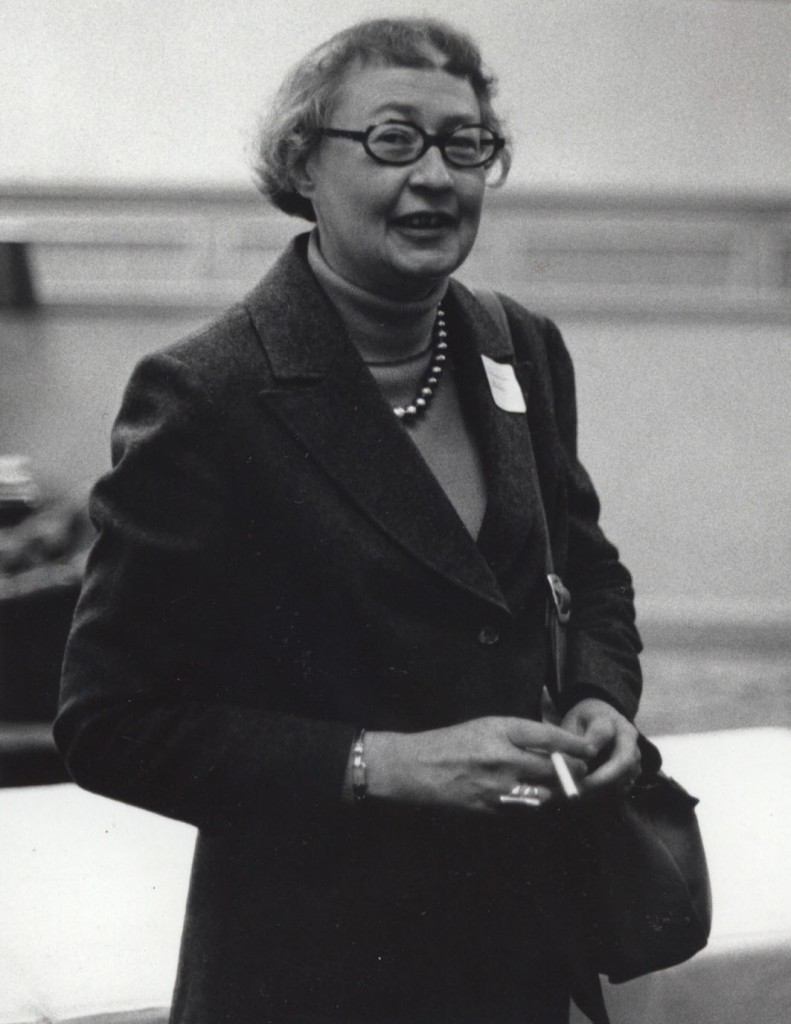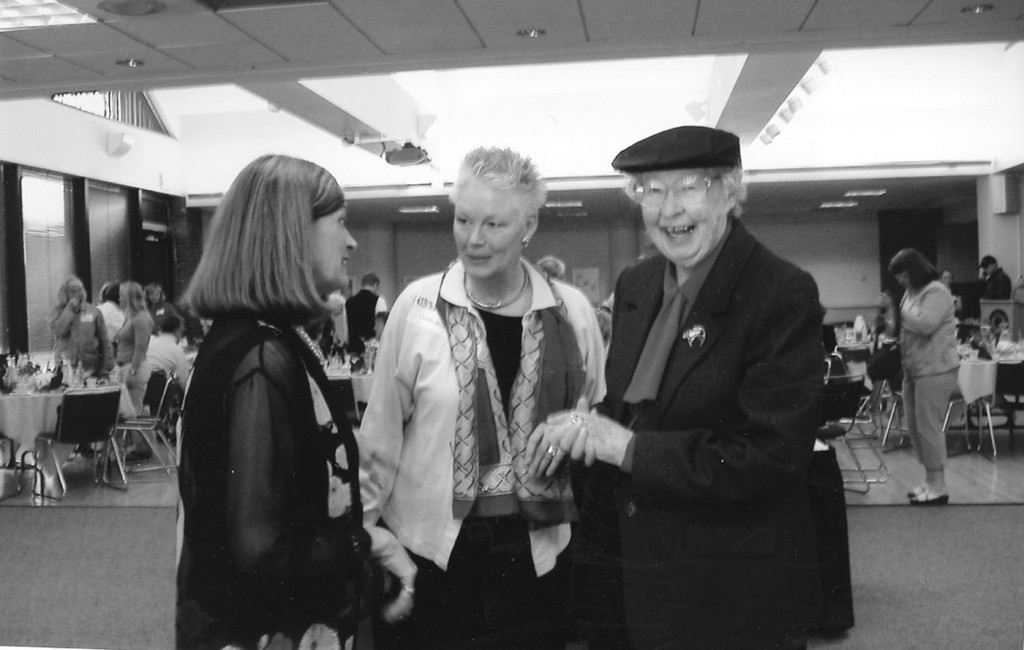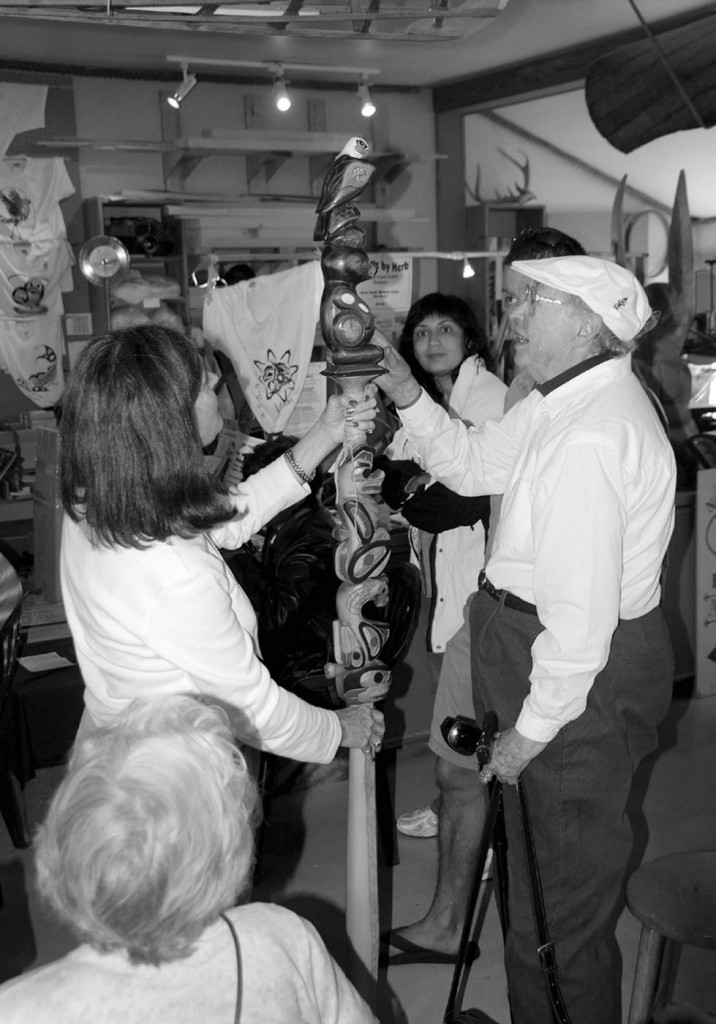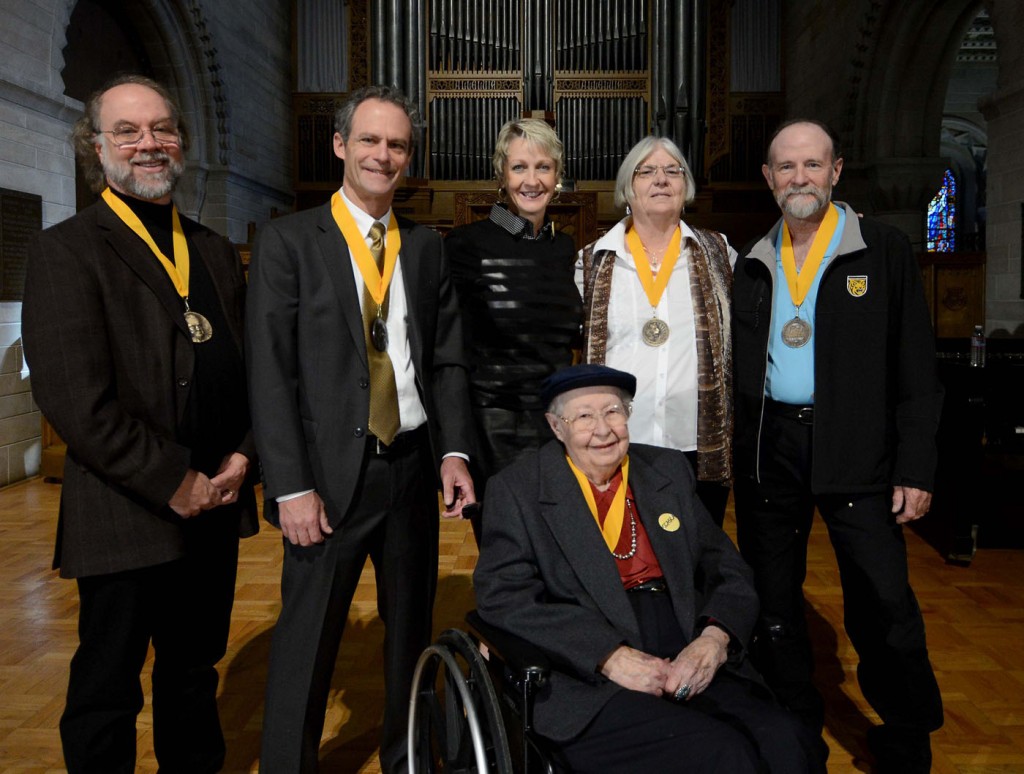By Laurie Laker ’12
 It takes a rare kind of dedication and passion to be a true teacher. Anyone can write a paper, even construct a syllabus. Not everyone can impart passion, change lives, and cultivate lifelong curiosity. Marianne Stoller was the most rare of teachers, doing all that and much more. She taught in Colorado College’s Anthropology Department for 29 years. All of us at Colorado College were deeply saddened to learn of her Dec. 13, 2015 passing. Throughout her long association with CC, Stoller had a profound impact on thousands of students, faculty, and staff. What follows here is a small celebration of her life and work, part of a larger testament to her influence, enjoyment, and lifelong love of learning.
It takes a rare kind of dedication and passion to be a true teacher. Anyone can write a paper, even construct a syllabus. Not everyone can impart passion, change lives, and cultivate lifelong curiosity. Marianne Stoller was the most rare of teachers, doing all that and much more. She taught in Colorado College’s Anthropology Department for 29 years. All of us at Colorado College were deeply saddened to learn of her Dec. 13, 2015 passing. Throughout her long association with CC, Stoller had a profound impact on thousands of students, faculty, and staff. What follows here is a small celebration of her life and work, part of a larger testament to her influence, enjoyment, and lifelong love of learning.
Growing up in the small southern Colorado town of San Luis in the San Luis Valley, the seeds of Stoller’s anthropological curiosity were sown in a beautiful, complex landscape. Attending the San Luis Valley’s best four-year college, Adams State College in Alamosa, Stoller graduated in 1949 with her B.A. in Art. She went on to receive her master’s degree in anthropology at the University of Denver in 1955, focusing on the anthropology of Oceania. During her time at DU, Stoller was a Fulbright Scholar from 1951-52, traveling to New Zealand to study Maori artwork, as well as to Fiji and Tahiti.
Her time in Tahiti would set the tone for the rest of her professional career, as it was there that Stoller first became interested in the ethnographic history — the study of people in historic times. Stoller received her Ph.D. from the University of Pennsylvania in 1979. From the east coast, she migrated back towards the mountain west, her first and true home.
Stoller first arrived at Colorado College in 1969, joining the Anthropology Department on a part-time basis. Soon, though, her prolific research, departmental involvement, and teaching mandated a change in status. Teaching an average of seven and a half blocks a year as an adjunct professor, as well as working with advisees and senior thesis students, Stoller went well beyond the requirements of a part-time faculty member. As a result, in 1979, Stoller was made a full-time member of the faculty as an associate professor. In 1980, she received tenure.
A huge part of Stoller’s legacy is rooted in dirt, in digging. Leading summer digs throughout the ’80s and ’90s, Stoller and her students helped uncover some truly astonishing pieces of regional history. Working in La Cienega, New Mexico, at a site not far from a trailer park, Stoller and her teams helped unearth the largest 17th century Spanish colonial settlement in New Mexico. This process took years, and each time the CC teams of students and college alumni returned to the site, they would find new structural foundations, boundaries, artifacts — piecing history together, piece-by-piece. As evidence to the power of these experiences, “the Diggers” continue to schedule reunions to this day.
 Stoller’s impact on Colorado College’s campus was no less profound than her fieldwork. In 1980, she helped Professor Joseph Gordon found the college’s Southwest Studies program, the first regional interdisciplinary program in the country. While neither had specific experience in area studies, with Professor Gordon teaching in the English Department and Stoller in anthropology, their combined expertise laid the groundwork for what would become one of CC’s most unique and attractive academic components. Now part of the Hulbert Center for Southwest Studies, the early core of the curriculum included summer studies for teachers in the college’s MAT program. The summer institute classes became a staple of college life over the years, and the included field trips part of CC’s international reputation as an institution not simply confined to classrooms and chalkboards.
Stoller’s impact on Colorado College’s campus was no less profound than her fieldwork. In 1980, she helped Professor Joseph Gordon found the college’s Southwest Studies program, the first regional interdisciplinary program in the country. While neither had specific experience in area studies, with Professor Gordon teaching in the English Department and Stoller in anthropology, their combined expertise laid the groundwork for what would become one of CC’s most unique and attractive academic components. Now part of the Hulbert Center for Southwest Studies, the early core of the curriculum included summer studies for teachers in the college’s MAT program. The summer institute classes became a staple of college life over the years, and the included field trips part of CC’s international reputation as an institution not simply confined to classrooms and chalkboards.
Over the course of her teaching career, Stoller’s Ethnohistory of the Southwest course became synonymous with the Colorado College experience. A two-block class, with fieldwork and residency in Santa Fe for one of the blocks, students worked with the New Mexico State Archives and got first-hand experience into Stoller’s beloved world. Her Art and Cultures of the Southwest class became a staple of the social sciences at Colorado College, its field trip a highlight of many students’ college careers. She also taught classes at the Newberry Library in Chicago. She twice chaired the Anthropology Department and served as director for the Southwest Studies summer institutes. Though she retired from teaching at CC in 1998, Stoller remained as active as ever in anthropological and ethnohistorical causes.
 Ever the prolific academic and researcher, she served on the Board of Managers for the college’s Woman’s Educational Society. Her love of working in the field transferred to Stoller leading many tours of the Southwest and other regions, including the California missions and the Canadian Rockies. Through these tours, as well as her passionate engagement and deep knowledge of her subject, Stoller helped raise more than $50,000 in scholarship funds for the Woman’s Educational Society. She reviewed grants for several years for the National Endowment for the Humanities, and served as president of the American Society for Ethnohistory. Following a legal case that returned “usufruct” rights to Stoller’s hometown of San Luis, Colorado, she received an award from the Colorado Lawyers Commission for her work as an expert witness. (Usufruct is a civil law term referring to the right of one individual to use and enjoy the property of another, provided its substance is neither impaired nor altered.)
Ever the prolific academic and researcher, she served on the Board of Managers for the college’s Woman’s Educational Society. Her love of working in the field transferred to Stoller leading many tours of the Southwest and other regions, including the California missions and the Canadian Rockies. Through these tours, as well as her passionate engagement and deep knowledge of her subject, Stoller helped raise more than $50,000 in scholarship funds for the Woman’s Educational Society. She reviewed grants for several years for the National Endowment for the Humanities, and served as president of the American Society for Ethnohistory. Following a legal case that returned “usufruct” rights to Stoller’s hometown of San Luis, Colorado, she received an award from the Colorado Lawyers Commission for her work as an expert witness. (Usufruct is a civil law term referring to the right of one individual to use and enjoy the property of another, provided its substance is neither impaired nor altered.)
In 2001, in appreciation for their contributions to both CC and the college’s museum, the Hulbert Center for Southwest Studies dedicated its “Millennium Exhibit” to both Stoller and her Geology Department colleague Professor Bill Fischer. Featuring artifacts varying in age and origin from across the American Southwest, the exhibition paid tribute to the role of both Fischer and Stoller in the intellectual life of the college and the larger southwestern historical community.
 On October 11, 2014, Stoller was awarded the Gresham Riley Award at CC’s Honors Convocation. Recognizing faculty, administrators, and staff who’ve made significant contributions to the life of the college, the award can lightly touch the profound impact of Stoller on generations of this community. For nearly half a century, Marianne Stoller taught, learned, and explored at Colorado College. She pushed boundaries throughout the region in her research, in the lives of her many students, and in herself. A true lover of her craft, and a “digger” of wonderful renown — we’re proud and humbled to celebrate Professor Stoller’s life and legacy.
On October 11, 2014, Stoller was awarded the Gresham Riley Award at CC’s Honors Convocation. Recognizing faculty, administrators, and staff who’ve made significant contributions to the life of the college, the award can lightly touch the profound impact of Stoller on generations of this community. For nearly half a century, Marianne Stoller taught, learned, and explored at Colorado College. She pushed boundaries throughout the region in her research, in the lives of her many students, and in herself. A true lover of her craft, and a “digger” of wonderful renown — we’re proud and humbled to celebrate Professor Stoller’s life and legacy.
The college will host a celebration of Stoller’s life and legacy during this year’s Homecoming Weekend. We encourage all those with stories of Professor Stoller to attend, and help us honor this magnificent woman.
Share your anecdotes and recollections about this wonderful member of our community!
If you have photos of Marianne to share, please email them to communications@coloradocollege.edu.









11 Responses to Professor Emerita Marianne Stoller
Laurie, it is a great piece. Thank you so much for writing and paying tribute to all of Marianne’s accomplishments and her humanitarian gifts to all of us at Colorado College.
Beautifully written!
Marianne was my teacher, mentor and friend. I stayed in constant contact with her after I graduated from CC in 1976. She mentored me through graduate school and she celebrated with me (from afar) when I passed my Ph.D. entrance exams, and then. my diploma. I always came back “home” to Marianne’s house to see her on a yearly basis. She was truly the greatest influence in my choice of career path (becoming an anthropologist). The way I teach my anthropology classes now, with field trips and special activities beyond the classroom, was directly related to CC’s anthro. dept. and all the great people they had and still have there. I was teaching an anthro course at CC with my big brother David during the second block. I remember visiting Marianne for the last time. I told her I would be back and she said, “I’m not sure I will still be here Laurie.”
I miss you Marianne. You made my world a much better place.
I had the privilege and joy of spending a lot of time with Marianne going all over the southwest. When I return to those places, I always think of her. She has my greatest admiration and gratitude. But probably a little-known comment from her that I also remember was when we were driving through campus once and she said sarcastically, “I don’t have to stop for the students who are crossing the street because it is my job to stamp out ignorance, that is what a professor is supposed to do.” I will miss her.
Too funny, Chris! I remember her making similar comments.
What a beautiful, vibrant, passionate, educated and dedicated Professor. I will always remember her smile and love of teaching Anthropology. She had much to do with my choosing Anthropology as a major. I especially remember her welcoming all of us (in one of her classes) to her home which was such a warm and magnificent reflection of the person she was and her vast interests. It was almost like entering into a museum. I also remember the block we had with her in Santa Fe. I wrote an in-depth paper re: the items that the previous residents left for their loved-ones in their wills and what that told us about the culture back then. She was so incredibly encouraging of my work. I am so grateful to have crossed paths with her from 1982 – 1986. Her Spirit will always inspire me in my work and personal connections to others.
This is a beautiful remembrance of Marianne. I was one of the students whose lives was changed by taking her Ethnohistory of the Southwest course and her Aesthetics of the Southwest (which she co-taught with Jane Cauvel). I also had the opportunity to serve as a research assistant for her Summer Institute on the Southwest–my first job after graduation. Marianne was influential in my decision to go to graduate school in anthropology, although I think she never quite forgave me for going to the University of Chicago rather than her beloved Penn. She was a generous friend of our family–she hosted a lovely party for our wedding, and we returned to visit her whenever we had the chance. I last saw Marianne in spring 2015, when she showed a great deal of interest in my students’ work in the Southwest. Although she was weak and in pain, her mind was as sharp as ever. I remember Marianne with great love and gratitude.
I was saddened to hear of Marianne’s passing. She was one of the professors who most influenced my career; along with Mike Hoffman, she lured me away from a Biology major. And her influence was more than just classes like Ethnohistory of the Southwest or working under her on an honors thesis — like other generous faculty at CC, she also let me stay at her house when I had no other place to live, and she hired me to do work at her house so that I could finish my degree. Marianne’s legacy will live on in all of us who were lucky enough to be her students.
Marianne Stoller what an outstanding representative of what our world should be!!!.
She was a great teacher, mentor, historian, and friend to all who knew her.
Les and I met her through the WES organization and WES Trips all over the west.
She was my buddy and I could ask her the strangest or weirdest question and she
would always give me a logical, understandable answer. She always had time for
me and my antics.
What a wonderful person and friend—a HUGE Bronco fan!!
We say her this fall and what a happy afternoon.
I know she was watching and cheering for her favorite Broncos Last night.
Lift up your glasses to a wonderful lady and friend!
The world will miss you!!
Greg & Lesley Flaks
I’m a current senior Anthropology major at Colorado College, and I was lucky enough to be awarded the Marianne Stoller Scholar Award by the Women’s Educational Society during my freshman year. I visited with Marianne several times while at CC, and she became a sort of surrogate grandmother – a powerful image of what a long, impactful life as a woman in Anthropology could look like. I’ll never forget asking her, worried for my own future, how she balanced life as a mother and an academic professional. Her response was a simple, “Stay up late and wake up early. Work while everyone else is asleep.” I loved having cookies and coffee at her house and hearing stories about her own undergrad life (like using bed sheets to climb out of her dorm window at night!) or all the ways in which CC used to be different while she taught there. I’m thankful to WES for introducing me to her, and to her for keeping me grounded and for the wonderful breaks from the bustle of college life. She will be dearly missed!
I loved Marianne Stoller. She changed my life when she was my professor in Southwest Studies Institutes. We had many trips to the field then, and later when she lead us to the Southwest for the Women’s Educational Society. She had wonderful knowledge and perspective. I learned so much from Marianne and I will forever be grateful.